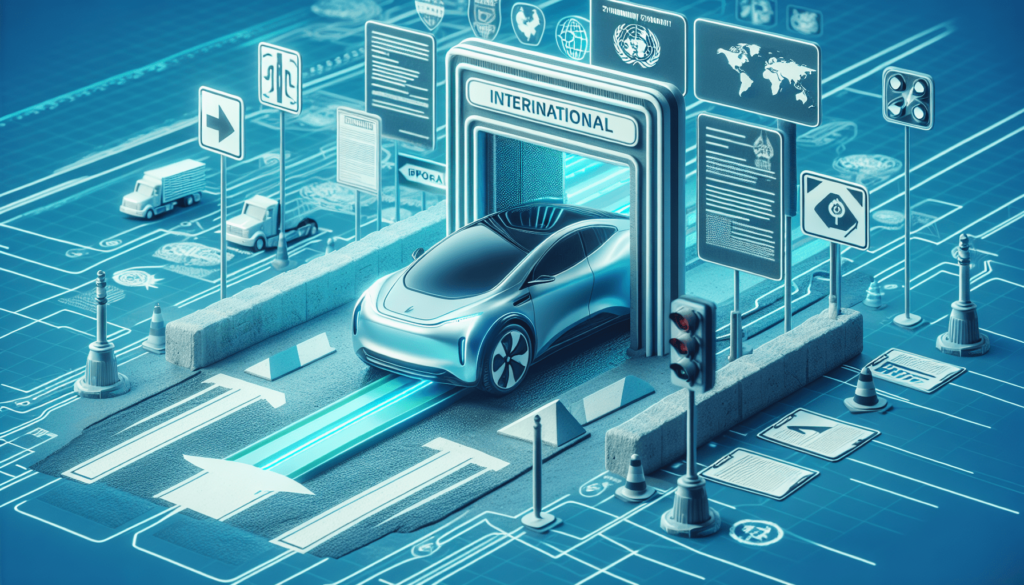So, you’re curious about how electric vehicle imports are regulated? It’s an important question, especially as the popularity of electric cars continues to rise. In a world striving for cleaner energy options, the demand for electric vehicles is increasing worldwide. However, with this increase in demand comes the need to ensure that these imported vehicles meet safety standards, adhere to environmental regulations, and are properly classified for customs purposes. In this article, we’ll explore the various factors involved in the regulation of electric vehicle imports, shedding light on the processes and guidelines that help ensure the smooth and safe arrival of these eco-friendly vehicles. So buckle up and let’s delve into the world of electric vehicle imports!

Import regulations for electric vehicles
Electric vehicles (EVs) are becoming increasingly popular and desirable for their environmental benefits and cost-saving potential. As more countries embrace this technological shift, it is crucial to understand the import regulations surrounding electric vehicles. These regulations can vary both at the national and international levels, encompassing aspects such as import duties and taxes, safety and environmental standards, as well as vehicle inspections and certifications. Let’s explore these regulations in detail.
National regulations
Import duties and taxes
When importing electric vehicles into a country, one of the first considerations is the applicable import duties and taxes. These fees are imposed by the national government and can significantly impact the overall cost of importing EVs. Import duties are typically levied on the value of the vehicle, also known as the customs value. The specific rates of these duties may vary depending on the country and can be based on factors such as the vehicle’s origin and the category it falls under.
Safety and environmental standards
Another vital aspect of import regulations is ensuring that imported electric vehicles meet the required safety and environmental standards. Car accidents can have severe consequences, and it is the responsibility of the importing country to ensure that the vehicles being brought in adhere to strict safety criteria. This includes compliance with crash testing and safety standards. Similarly, environmental impact is a significant concern, with governments striving to mitigate pollution caused by vehicle emissions. Hence, imported EVs must meet specific emission standards and certifications to minimize their carbon footprint.
Vehicle inspections and certifications
To ensure compliance with national regulations, importing countries often conduct extensive vehicle inspections and demand certifications. These inspections involve a thorough assessment of the vehicle’s condition, verifying that it meets all safety and emissions standards set by the national authorities. Moreover, certifications for electric vehicles are typically required to validate compliance with local regulations. These certifications are essential in assuring both regulators and consumers that the imported EVs are of high quality and conform to the necessary standards.
Import duties and taxes
Tariffs and customs duties
One key element of import regulations for electric vehicles is the imposition of tariffs and customs duties. Tariffs refer to taxes levied on imported goods, including electric vehicles, and are usually based on a percentage of the vehicle’s value. Customs duties are similar, but they specifically apply to goods being brought into a country. The rates for these tariffs and customs duties can vary widely and are determined by the importing country’s trade policies and agreements with other nations.
Value-added tax
In addition to tariffs and customs duties, electric vehicle imports may also be subject to value-added tax (VAT). Value-added tax is a consumption tax levied on the value added at each stage of the production and distribution chain. When an electric vehicle is imported, the VAT is typically applied to the vehicle’s final price, including any import duties or tariffs already paid. The specific VAT rate can vary among countries, affecting the overall cost of importing an electric vehicle.
Excise taxes
Many countries also impose excise taxes on electric vehicle imports. Excise taxes are specific to certain types of goods and are typically levied at the point of manufacture or importation. These taxes serve various purposes, including revenue generation for the government and discouragement of excessive consumption. Electric vehicle imports can be subject to excise taxes intended to promote sustainable transportation or support local industries. The rates and structure of these taxes depend on the specific policies of the importing country.
Safety and environmental standards
Crash testing and safety standards
Safety is paramount when it comes to importing electric vehicles. Governments set stringent crash testing and safety standards to protect both drivers and pedestrians. These standards typically include requirements for crash testing the vehicles under various scenarios to assess their structural integrity and occupant protection. Importing countries often require vehicles to undergo rigorous testing to ensure they meet or exceed these safety standards. Such measures aim to minimize the risks associated with road accidents and ensure the overall safety of electric vehicle users.
Emission standards and certifications
Mitigating the environmental impact of transportation is a crucial goal for many countries. To achieve this, governments establish emission standards for imported electric vehicles. These standards define the maximum allowable levels of pollutants emitted by the vehicles. Importers must demonstrate compliance with these standards through relevant certifications. By ensuring that imported electric vehicles meet stringent emission limits, countries can effectively contribute to reducing air pollution and combating climate change.
Battery safety standards
Electric vehicle batteries are a critical component, and their safety is a top priority. Import regulations often require EV batteries to meet specific safety standards. These standards encompass various aspects, including protection against overheating, fire resistance, and appropriate handling procedures for damaged or faulty batteries. By enforcing battery safety standards, importing countries can provide reassurance to consumers, promote confidence in electric vehicles, and mitigate safety risks associated with the widespread use of EVs.

Vehicle inspections and certifications
Inspection procedures
Vehicle inspections play a vital role in verifying the compliance of imported electric vehicles with national regulations. Inspection procedures typically involve a comprehensive assessment of the vehicle’s safety features, structural integrity, emissions, and overall condition. Trained inspectors carry out these inspections to ensure that the imported EVs adhere to the required standards. By conducting thorough inspections, importing countries can promptly identify any deficiencies or non-compliance, enabling the necessary corrective measures to be taken.
Certification requirements
Certifications serve as official confirmation that an imported electric vehicle meets all necessary safety, environmental, and technical requirements. Certification requirements can vary among countries, but they generally involve documentation and evidence that demonstrates compliance with relevant standards. Importers must often provide specific test reports, technical specifications, or declarations of conformity to obtain the required certifications. These certifications serve as an indication that the EVs meet the necessary standards and can be legally sold and operated within the importing country.
Compliance with local regulations
Compliance with local regulations is essential for any imported electric vehicle. Beyond inspections and certifications, importing countries may have further requirements or specific regulations that must be adhered to. These can encompass aspects such as labeling, vehicle registration, maintenance regulations, and accessibility for disabled individuals. Compliance with these additional regulations ensures that imported EVs fully meet the expectations and requirements of the national authorities and local communities.
International regulations
World Forum for Harmonization of Vehicle Regulations (WP.29)
The World Forum for Harmonization of Vehicle Regulations (WP.29) is a global initiative aiming to harmonize vehicle regulations and standards across different countries. By encouraging cooperation and consensus among participating nations, WP.29 works towards ensuring better road safety, environmental performance, and efficient trade in vehicles and their components. WP.29 facilitates the implementation of UNECE regulations worldwide and promotes mutual recognition of vehicle approvals, reducing barriers for international vehicle imports.
United Nations Economic Commission for Europe (UNECE) regulations
The United Nations Economic Commission for Europe (UNECE) establishes regulations and standards for improving sustainable mobility and ensuring the safety and environmental performance of vehicles. These regulations cover a wide range of aspects, including vehicle construction, components, and systems. UNECE regulations contribute to the development of harmonized vehicle standards globally, facilitating the international trade of electric vehicles and their components.
Regional and bilateral agreements
In addition to international organizations like WP.29 and UNECE, regional and bilateral agreements play a role in regulating electric vehicle imports. Free trade agreements between countries often address automotive trade, including the importation of electric vehicles. Such agreements aim to reduce tariffs, streamline import processes, and promote fair and open competition. Furthermore, bilateral agreements focused on harmonizing vehicle regulations can lead to the mutual recognition of certifications, simplifying the importation process for EVs between specific countries.
Challenges and areas for improvement
While import regulations for electric vehicles have made significant progress, challenges and areas for improvement remain. Addressing these issues can enhance the efficiency and effectiveness of regulations, further promoting the adoption and importation of electric vehicles.
Harmonization of standards
Harmonizing standards across jurisdictions is crucial to avoid duplication of efforts and unnecessary administrative burdens. Currently, there are differences in safety and environmental standards among countries, leading to additional testing and certification requirements for imported electric vehicles. By harmonizing these standards, countries can reduce costs and streamline the import process, encouraging greater international trade and market accessibility for electric vehicles.
Streamlining certification processes
Certification processes for electric vehicle imports can sometimes be complex and time-consuming. This can deter importers and slow down the availability of EVs in certain markets. Streamlining certification processes, including the acceptance of international test reports and certifications, can expedite the importation of electric vehicles. Collaboration among regulatory bodies, mutual recognition agreements, and sharing of best practices can help simplify and align certification requirements, benefiting both importers and consumers.
Addressing trade barriers
Trade barriers, such as high tariffs or non-tariff barriers, can impede the importation of electric vehicles. These barriers hinder global market access and limit consumer choices. Governments should strive to reduce or eliminate such barriers to facilitate the international importation of electric vehicles. By removing trade barriers, countries can encourage competition, drive innovation, and unlock the full potential of electric mobility on a global scale.
In conclusion, understanding import regulations for electric vehicles is crucial in facilitating their global dissemination. National regulations cover import duties and taxes, safety and environmental standards, as well as vehicle inspections and certifications. International regulations, such as those established by WP.29 and UNECE, aim to harmonize standards and facilitate trade. While challenges exist, such as the need for harmonization and streamlining certification processes, addressing these areas can help overcome barriers and accelerate the adoption of electric vehicles worldwide.

